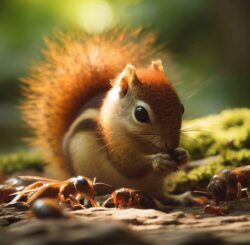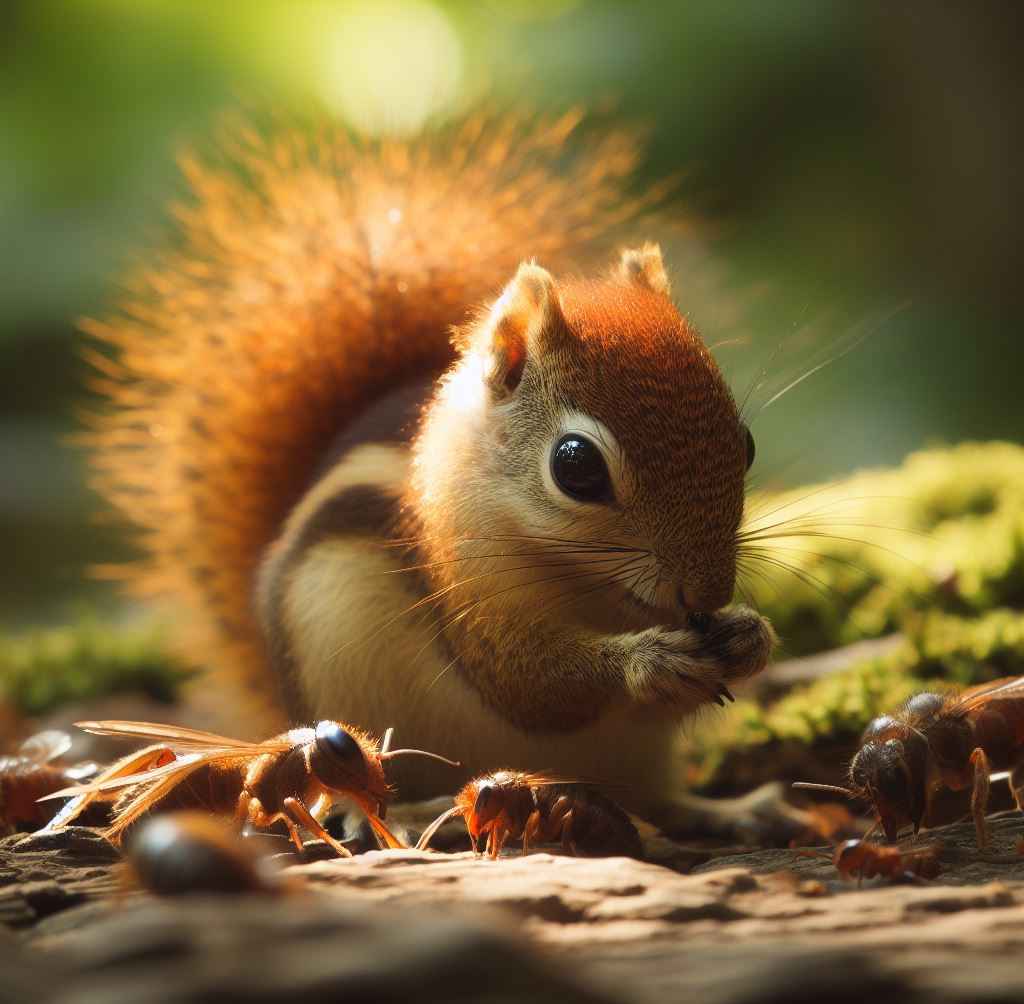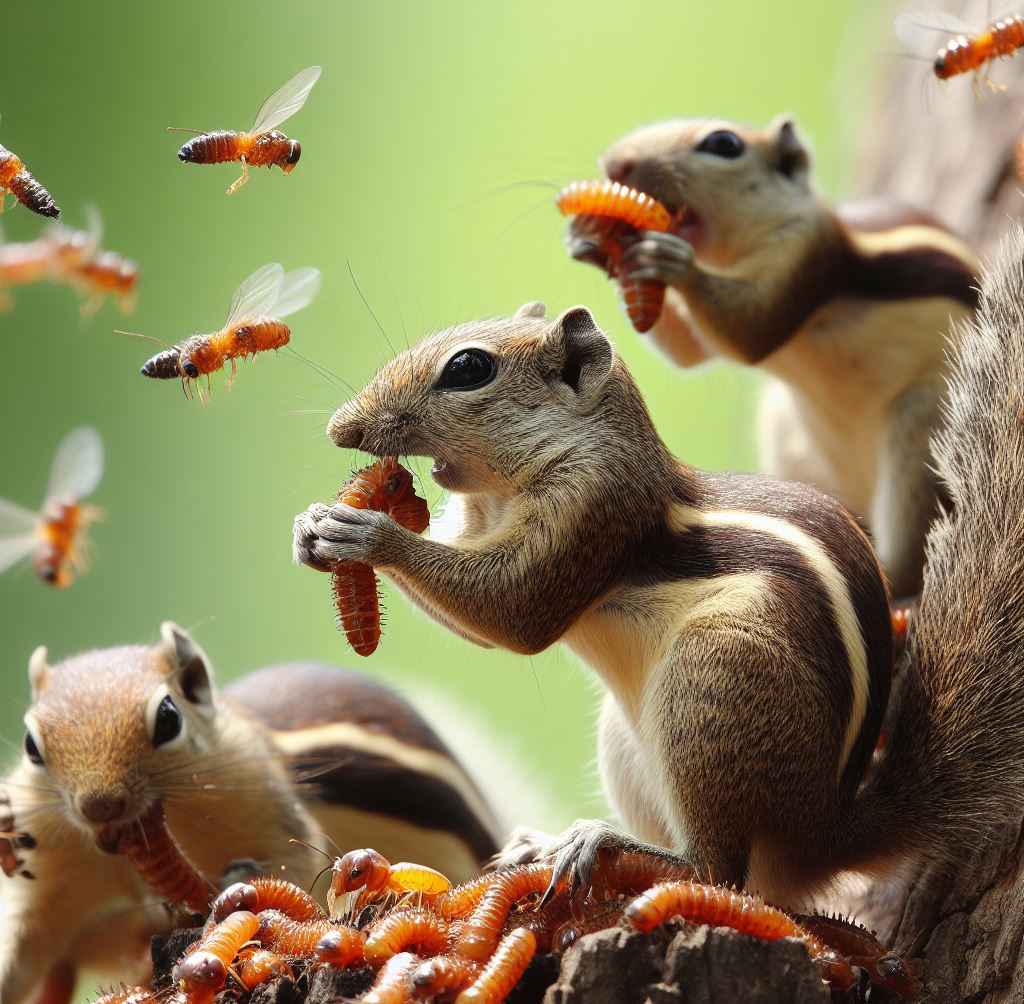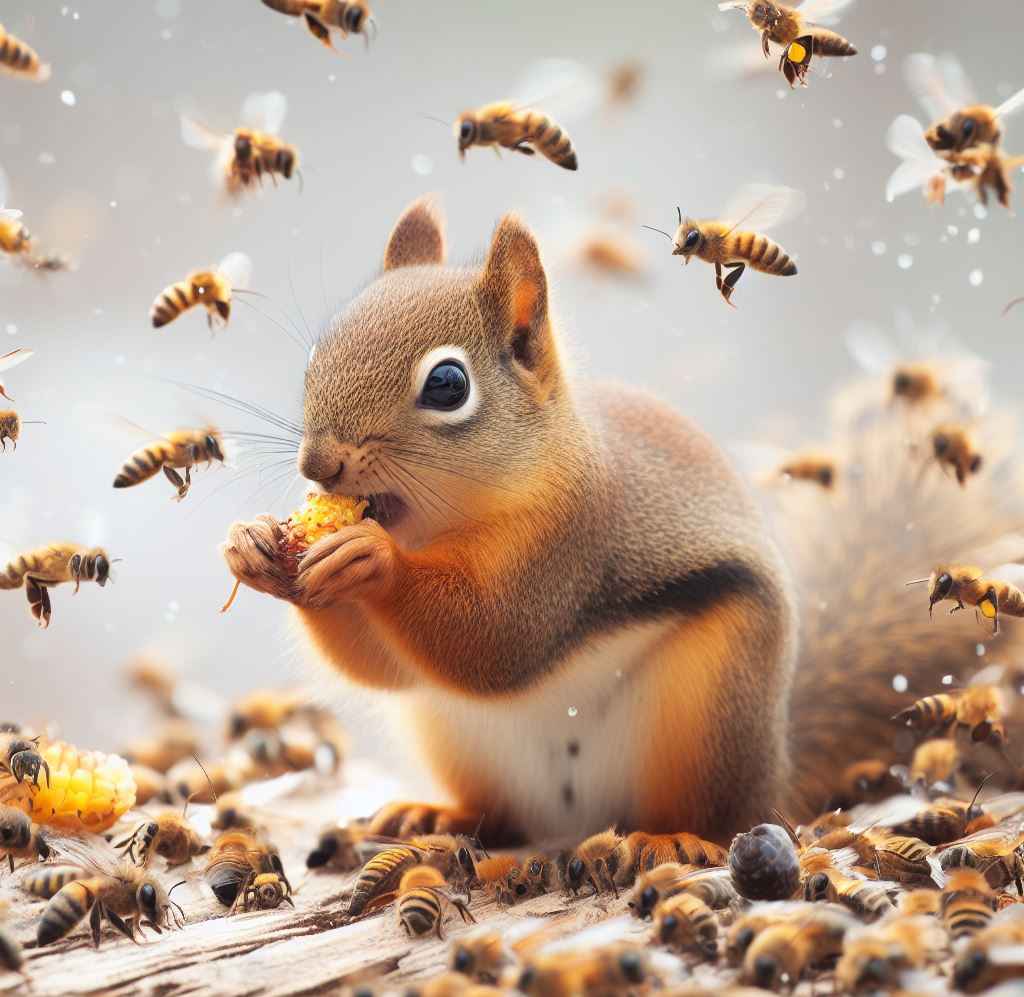Why Do Squirrels Eat Insects?
Answer to the question Do Squirrels Eat Insects? Yes, squirrels eat insects. They do much rather eat fungi, apples, fruits, nuts and seeds than insects. It is unclear that they would eat ants or grubs from the ground if they had access to their favorite foods. Apples, nuts, seeds and fungi are favored by squirrels over insects.
Their reputation for enjoying nuts and seeds, squirrels also eat caterpillars and beetles. In addition to the nutrients found in nuts and seeds, these insects supply important proteins and lipids. Research based on observation reveals that squirrels are not purely herbivores, since they have been observed to hunt and eat insects.
Insects do serve a supporting function in a squirrel’s diet, providing nutritional advantages that support their general well being and resiliency. Different squirrel species and populations may consume insects more or less frequently depending on variables such as location and seasonal variations. Squirrels are known for their love of nuts and seeds but they also occasionally like eating insects which shows how diverse their diet is.
Introduction:
Amazing animals, squirrels may sometimes be seen deftly scurrying from tree to limb. Many people have queries about what they eat and some even wonder if they eat insects. We’ll examine the specifics of a squirrel’s diet in this investigation and see if insects are a factor.
What Insects Do Squirrels Eat?
Due to their natural need to save energy, squirrels eat a wide variety of insects, such as mealworms, ants, grubs, snails, caterpillars, and spiders depending on what is available.
As tree dwelling mammals, squirrels eat a variety of insects such as grasshoppers, beetles, caterpillars, and ants. These microscopic animals provide their plant-based diet a protein rich boost and vital elements that are necessary for good health. While caterpillars are rich in nutrition but beetles provide a delightful crunch with their crunchy exoskeletons.
Hop is added to the diet of grasshoppers and ants make a fun snack. Squirrels are skilled hunters who catch and eat insects to increase the variety of foods they eat. It’s important to keep in mind that squirrels may be enjoying a diverse, high-protein diet that includes insects when you see them eating on nuts. This shows the squirrels’ flexibility and interesting food choices in the environment.
Do Squirrels Eat Other Organisms?
Being omnivores, squirrels tend to eat meat found in their natural environment such as tiny snakes, lizards, mice and insects. It is not unusual to see them eating meat.
Performers in the treetops, squirrels are well-known for their love of nuts and seeds. They are also opportunistic feeders, taking advantage of opportunities to eat insects, bird eggs, fledglings and reptiles. Studies based on observation have revealed squirrels engaging in hunting behavior, showing their capacity to catch and eat other living things.
But not all squirrel species behave in this way and there may be differences in the amount of other creatures that squirrels eat. In order to satisfy their nutritional demands, other creatures mostly rely on nuts, seeds and plants as basic foods. They are expert hunters that prefer eating plants, squirrels are not opposed to varying up their diet by occasionally chowing down on other living things.
Why Do Squirrels Eat Insects?
When food shortages occur, squirrels rely heavily on insects which are high in protein, fat, vitamins and minerals. They can collect a lot of insects with ease so they could get more protein per gram than they would from meat.
Fast moving residents of trees, squirrels mostly eat nuts, seeds and other plants; they also add insects to their diet. Rich in protein, insects are vital to human welfare, muscular growth, reproductive health and resistance to environmental stressors. They actively seek for catch insects by showing their flexibility and capacity to vary their diet in response to different food sources.
Environmental considerations also matter since squirrels may survive in different environments by eating more insects in locations where insects are plentiful. A squirrel’s capacity to balance plant-based and protein-rich foods can be seen by the strategic decision it makes to include insects in its diet. This option enhances the nutritional variety of the squirrel and increases its general force and chances of survival in the wild.
Do Squirrels Eat Cockroaches?
Because they like nuts and fruit, squirrels usually avoid eating them. A squirrel can gain from a cockroach’s high calcium, magnesium, potassium and other vitamin and mineral content, though, if it manages to catch and kill one.
Being famous for gathering nuts, squirrels do not place a high value on insects in their diet. For vital nutrients, they mostly concentrate on nuts, seeds, fruits and plants. Because they are ground-dwelling and nocturnal, cockroaches are not a common component of a squirrel’s diet. Even though they occasionally try new insects, squirrels choose their food according to what’s available and what they need to eat.
Cockroaches are not a regular or favored food source but their versatility permits them to investigate a variety of food sources. In conclusion, squirrels show considerable dietary flexibility also it seems unlikely that they will consistently eat cockroaches.
Facts & Features Of Squirrels:
- A unique kind of rodent, squirrels are renowned for their nimbleness, ability to do acrobatics and ever-growing, sharp incisors that enable them to chew through seeds and nuts.
- Nuts, seeds, fruits and plants make up the majority of their food, demonstrating their flexibility to many conditions.
- Being skilled hoarders, squirrels gather and store nuts for the winter, which promotes the regrowth of forests.
- Their ability to solve problems is shown in their ability to move through challenging obstacle courses in order to obtain food.
- Additionally, because they aid in the spread of seeds and the expansion of forests, squirrels are essential to ecology.
- Even though they are little, they have a big influence on the ecology.
- Squirrels are essentially active, resourceful animals who are deeply rooted in their environments and make a lasting impact on anybody who witnesses their antics.
FAQs:
1 Do squirrels like bugs?
Absolutely! Squirrels have a diverse palate and they do enjoy munching on bugs. While nuts and seeds remain staples, insects provide a protein-packed snack for these adaptable foragers.
2 Do squirrels eat grasshoppers?
Squirrels are known to include grasshoppers in their diet. These agile creatures showcase their adaptability by incorporating a variety of insects, including grasshoppers, alongside their usual nutty delights. It is a protein rich addition to their menu in the wild.
3 What is a squirrel’s favorite food?
A squirrel’s favorite food often includes nuts especially acorns and walnuts. They have a penchant for seeds, fruits, and even the occasional insects showing their diverse palate. In the world of squirrels, it’s a nutty affair with a side of natural delights!
4 Do squirrels eat beetles?
Squirrels are known to indulge in beetles as part of their diet. These resourceful foragers showcase their adaptability by including a variety of insects, beetles included in their menu. It adds a protein rich crunch to their usual nutty repertoire.
5 Do squirrels eat earthworms?
While squirrels are primarily herbivores, they occasionally eat earthworms. These protein-packed wrigglers add a nutritional boost to their diet showing the squirrels’ adaptability in seeking diverse food sources. So, yes, earthworms are on the menu for these resourceful foragers.




